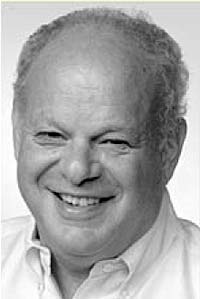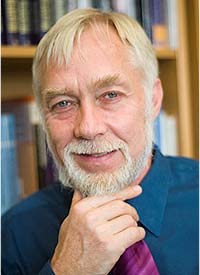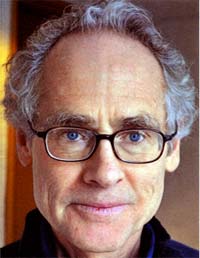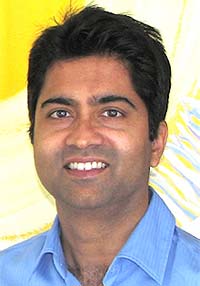Martin E.P. Seligman
 Martin E.P. Seligman is the Principal Investigator of Prospective Psychology Stage 1. He graduated Summa Cum Laude from Princeton in 1964 and received his Ph.D. in psychology from the University of Pennsylvania in 1967. He is currently the Zellerbach Family Professor of Psychology and Director of the Positive Psychology Center at the University of Pennsylvania. He was elected President of the American Psychological Association in 1996 by the largest vote in history.
Martin E.P. Seligman is the Principal Investigator of Prospective Psychology Stage 1. He graduated Summa Cum Laude from Princeton in 1964 and received his Ph.D. in psychology from the University of Pennsylvania in 1967. He is currently the Zellerbach Family Professor of Psychology and Director of the Positive Psychology Center at the University of Pennsylvania. He was elected President of the American Psychological Association in 1996 by the largest vote in history.
Dr. Seligman works on learned helplessness, depression, optimism, positive psychology and comprehensive soldier fitness. His research has been supported by the National Institutes of Health, the National Science Foundation, the John Templeton Foundation, the MacArthur Foundation, the Guggenheim Foundation, the Annenberg Foundation, and the Robert Wood Johnson Foundation.
Dr. Seligman is a best-selling author, having written 25 books which have been translated into more than 35 languages. His best-sellers include Learned Optimism (Knopf, 1991), The Optimistic Child (Houghton Mifflin, 1995), and Authentic Happiness (Free Press, 2002). His latest is Flourish (Free Press, 2011). He is the recipient of three Distinguished Scientific Contribution awards from the American Psychological Association, the Laurel Award of the American Association for Applied Psychology and Prevention, and the Lifetime Achievement Award of the Society for Research in Psychopathology. Dr. Seligman received both American Psychological Society’s Williams James Fellow Award (for contribution to basic science) and the James McKeen Cattell Fellow Award (for the application of psychological knowledge). He received the inaugural Wiley Psychology Lifetime Award of the British Academy for lifetime contributions to Psychology in 2009. He holds four honorary doctorates, including the University of Uppsala, Sweden, and Complutense University, Spain.
Roy F. Baumeister
 Roy F. Baumeister is currently the Eppes Eminent Scholar and Professor of Psychology at Florida State University. He received his Ph.D. in social psychology from Princeton in 1978 and did a postdoctoral fellowship in sociology at the University of California at Berkeley. He spent over two decades at Case Western Reserve University. He has also worked at the University of Texas, the University of Virginia, the Max-Planck-Institute, the VU Free University of Amsterdam, the University of California at Santa Barbara, and Stanford’s Center for Advanced Study in the Behavioral Sciences. Baumeister’s research spans multiple topics, including self and identity, self-regulation, interpersonal rejection and the need to belong, sexuality and gender, aggression, self-esteem, meaning, and self-presentation. He has received research grants from the National Institutes of Health and from the Templeton Foundation. He has over 500 publications, and his 31 books include Evil: Inside Human Violence and Cruelty, The Cultural Animal, Meanings of Life, and the New York Times bestseller Willpower: Rediscovering the Greatest Human Strength. The Institute for Scientific Information lists him among the handful of most cited (most influential) psychologists in the world. He has received lifetime achievement awards from the Society for Personality and Social Psychology, from the International Society for Self and Identity, and most recently the Association for Psychological Science’s highest honor, the William James Award.
Roy F. Baumeister is currently the Eppes Eminent Scholar and Professor of Psychology at Florida State University. He received his Ph.D. in social psychology from Princeton in 1978 and did a postdoctoral fellowship in sociology at the University of California at Berkeley. He spent over two decades at Case Western Reserve University. He has also worked at the University of Texas, the University of Virginia, the Max-Planck-Institute, the VU Free University of Amsterdam, the University of California at Santa Barbara, and Stanford’s Center for Advanced Study in the Behavioral Sciences. Baumeister’s research spans multiple topics, including self and identity, self-regulation, interpersonal rejection and the need to belong, sexuality and gender, aggression, self-esteem, meaning, and self-presentation. He has received research grants from the National Institutes of Health and from the Templeton Foundation. He has over 500 publications, and his 31 books include Evil: Inside Human Violence and Cruelty, The Cultural Animal, Meanings of Life, and the New York Times bestseller Willpower: Rediscovering the Greatest Human Strength. The Institute for Scientific Information lists him among the handful of most cited (most influential) psychologists in the world. He has received lifetime achievement awards from the Society for Personality and Social Psychology, from the International Society for Self and Identity, and most recently the Association for Psychological Science’s highest honor, the William James Award.
Peter Railton
 Peter Railton’s main research has been in ethics and the philosophy of science, focusing especially on questions about the nature of objectivity, value, norms, and explanation. Recently, he has also begun working in aesthetics, moral psychology, and the theory of action. He has a special interest in the bearing of empirical research in psychology and evolutionary theory on these questions. A collection of some of his papers in ethics and meta-ethics, Facts, Values, and Norms, appeared with Cambridge University Press in 2003. He has been a visiting professor at Berkeley and Princeton, and he has received fellowships from the Society for the Humanities (Cornell), the American Council of Learned Societies, the Guggenheim Foundation, the National Humanities Center, and the National Endowment for the Humanities. He is a Fellow of the American Academy of Arts and Sciences, and has been associated with CREA (Paris) and CSMN (Oslo). Professor Railton has been President of the American Philosophical Association, Central Division (2011-12) and is a recipient of the 2009 D'Arms Award for Distinguished Graduate Mentoring in the Humanities. In recent years he has worked and taught with psychologists in a number of fields. (B.A. Harvard, Ph.D. Princeton)
Peter Railton’s main research has been in ethics and the philosophy of science, focusing especially on questions about the nature of objectivity, value, norms, and explanation. Recently, he has also begun working in aesthetics, moral psychology, and the theory of action. He has a special interest in the bearing of empirical research in psychology and evolutionary theory on these questions. A collection of some of his papers in ethics and meta-ethics, Facts, Values, and Norms, appeared with Cambridge University Press in 2003. He has been a visiting professor at Berkeley and Princeton, and he has received fellowships from the Society for the Humanities (Cornell), the American Council of Learned Societies, the Guggenheim Foundation, the National Humanities Center, and the National Endowment for the Humanities. He is a Fellow of the American Academy of Arts and Sciences, and has been associated with CREA (Paris) and CSMN (Oslo). Professor Railton has been President of the American Philosophical Association, Central Division (2011-12) and is a recipient of the 2009 D'Arms Award for Distinguished Graduate Mentoring in the Humanities. In recent years he has worked and taught with psychologists in a number of fields. (B.A. Harvard, Ph.D. Princeton)
Chandra Sripada
 Chandra Sripada works on issues about mind and agency that lie at the intersection of philosophy and the behavioral and brain sciences. He received his PhD in philosophy from Rutgers University in 2006 and completed residency training in psychiatry at the University of Michigan in 2009. He holds a joint appointment at the University of Michigan. One appointment is in the Department of Psychiatry, where he studies brain mechanisms of self-control, decision-making, and prospection. The other appointment is in the Department of Philosophy where he tries to understand how emerging results from the sciences impact our picture of ourselves as free and rational agents.
Chandra Sripada works on issues about mind and agency that lie at the intersection of philosophy and the behavioral and brain sciences. He received his PhD in philosophy from Rutgers University in 2006 and completed residency training in psychiatry at the University of Michigan in 2009. He holds a joint appointment at the University of Michigan. One appointment is in the Department of Psychiatry, where he studies brain mechanisms of self-control, decision-making, and prospection. The other appointment is in the Department of Philosophy where he tries to understand how emerging results from the sciences impact our picture of ourselves as free and rational agents.
